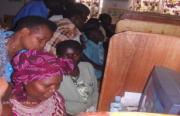The Debate over Intermediaries in Ag. Value Chain: E-TIC Project
For decades, the role of intermediaries between farmers and other stakeholders (researchers, policy makers, donors, etc.) has been key in the exchange of agricultural information, knowledge, innovation and other resources. The traditional intermediary role has been played over the years by the various national agricultural extension services but due to the challenges with this system, there is an emergent of the private sector intermediaries. However, with the advancement of information and communication technologies (ICTs) and their potential technological intermediary role, the role of “human” intermediaries is being questioned time after time.
While one school of thought thinks “technology”, specifically ICT will eventually eliminate and replace “human” intermediaries or the middlemen within the agricultural value chain, another school of thought believes that the “human factor” in extension cannot be eliminated. As a socio-technical researcher, I find myself between these two schools of thought. Even though, I have a stand in this debate (see bkaddom’s comments here), the recent selection of E-TIC project by the World Summit on Information Society (WSIS) as a success story during its 2010-2011 stocktaking gives me the courage to write this reflection.
The E-TIC project is an initiative involving various players coordinated by ICVolunteers, a nonprofit organization and being implemented in Senegal and Mali (Sahel region), with the support of the Fonds Francophone des Inforoutes and a series of other partners.
An important component of the E-TIC project, however, is the role that intermediaries are playing in this multidisciplinary network as “field connectors” by providing links between small farmers and “new technologies.” The project uses local connectors (human intermediaries) such as governmental representatives; community leaders; volunteers deployed in the localities; universities and journalists are used to gather information/data; community radio for the dissemination of information; mobile phone operators; local authorities; and NGOs, all of whom cooperate in sharing information relevant to the project.
The E-TIC project then facilitates the functions of these connectors by providing them with tools (technological intermediaries) and training components so that small farmers, herders and fishermen are better able to sell their products. Among these tools is the E-TIC website, to be translated into multiple languages – French, English, Wolof, Fulani and Bambara, as well as a number of other work and exchange tools (wiki, distribution list, etc.) for communication between project stakeholders. The Internet platform aims to provide information regarding agricultural activities, including production, marketing and promotion techniques, market prices and other useful data, both for the farmers themselves and other stakeholders, including researchers in this domain. Through the creation of this portal and a series of training courses for field connectors (youth, women, community radio journalists), the E-TIC project aims to provide knowledge relevant for efficient and effective farm management.
The architecture of the E-TIC project system shows a differentiation of intermediaries whose roles are being enabled by the new technologies and tools. Instead of seeing the intermediaries as a threat to exchange of resources – information, knowledge, innovation and even physical agricultural inputs, the project recognized as tools for strengthening the delivery of these resources.
I believe that the ‘human factor’ in the exchange of information between the smallholder farmer and other stakeholders in the agricultural sector is something that cannot be replaced. ICTs are technologies that could be used to improve social processes such as extension services. It is up to the stakeholders to identify what catalyzing role the ICTs can play in facilitating the social role of these intermediaries. The type of ICTs and the degree of use at the various stages of the value chain, may depend on a number of factors including the type of content being delivered, the size of the target audience, the educational status of the users, among others.
And I quote “ICTs have an important role to play for the populations in Senegal and Mali, but the specific applications need to be adapted to local needs and means, for example, low literacy and local languages. Given the relatively low literacy rate in most cases and a strong oral tradition with the use of local languages, the most common means of communication remains direct conversation (whether through farmers, herders, etc. meeting each other or speaking with each other by mobile phone) and community radio stations” (WSIS Success Stories 2011).







































